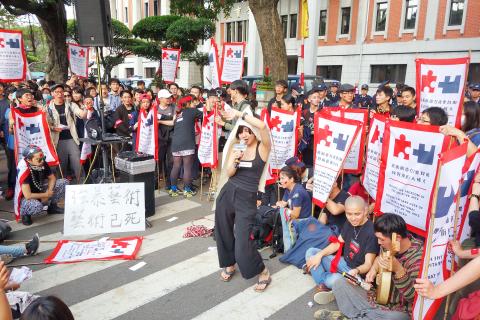Higher education in art in the nation’s south is under threat by a government plan to merge Tainan National University of the Arts (TNNUA) and National Cheng Kung University (NCKU), TNNUA students and faculty members said at a protest in Taipei yesterday.
Outside the Ministry of Education and the nearby Legislative Yuan, about 200 campaigners protested against the ministry’s plan, chanting slogans such as: “The system is murdering art,” “The arts need a southern perspective” and “Restore the north-south balance in art [education].”
Lawmakers who oppose the plan to merge the universities and were present at the protest panned the ministry, saying a motion had been passed by a legislative committee to halt the proposed merger.

Photo: Wu Po-hsuan, Taipei Times
Ministry of Education Secretary-General Wang Chun-chuan (王俊權) later issued a statement saying that the ministry would suspend the proposed merger as requested by the legislature, adding that it had “heard the voice of the faculty members and students.”
Ku Shih-yung (顧世勇), an installation artist and director of the Graduate Institute of Plastic Arts at TNNUA, said the merger would compromise the university’s unique educational model.
TNNUA focuses on individual mentoring and apprenticeship to train high-achieving artists based on European models, and the university’s students have a proven record at international exhibitions and competitions, Ku said.
However, the university’s achievements have not been recognized by the ministry’s performance metrics, which rate universities on quantitative rather than qualitative terms, Ku said.
As a result, the ministry has made a “highly unreasonable” demand for TNNUA to merge with NCKU on budgetary grounds alone, despite NCKU proving incapable of offering any clear educational vision for the arts, Ku added.
TNNUA student representative Cheng Hsiang-yu (鄭翔羽) said the university’s small size is an intended feature for its mission to promote artistic excellence, not a defect as the ministry perceived it to be.
The ministry has failed to grasp the internationally recognized necessity of having dedicated art schools with administrative autonomy, and its merger plan is a violation of the government’s stated policy for balanced distribution of resources in the north and south, Democratic Progressive Party (DPP) Legislator Cheng Li-chun said.
DPP Legislator Rosalia Wu (吳思瑤) said that private-sector actors have been working hard to promote education in the arts, but the government seems to be busy “killing it,” adding: “I am against amalgamation for the sake of amalgamation.”
DPP Legislator Huang Kuo-shu (黃國書) also lambasted the ministry as having led a “top-down effort” to “kill TNNUA’s founding spirit,” saying that the Education and Culture Committee earlier yesterday passed an impromptu motion to demand the ministry suspend the merger.
The ministry made plans to merge the universities because of TNNUA’s small size, remote location, low rating in performance metrics, a 70 percent subsidization rate of its budget and concerns over the school’s ability to enroll students, a ministry statement said.
The scheme would not have set a timetable for implementation and TNNUA would have been able to opt out by providing an alternative plan of improvement to its educational and fiscal performance, the ministry added.

A preclearance service to facilitate entry for people traveling to select airports in Japan would be available from Thursday next week to Feb. 25 at Taiwan Taoyuan International Airport, Taoyuan International Airport Corp (TIAC) said on Tuesday. The service was first made available to Taiwanese travelers throughout the winter vacation of 2024 and during the Lunar New Year holiday. In addition to flights to the Japanese cities of Hakodate, Asahikawa, Akita, Sendai, Niigata, Okayama, Takamatsu, Kumamoto and Kagoshima, the service would be available to travelers to Kobe and Oita. The service can be accessed by passengers of 15 flight routes operated by

Alain Robert, known as the "French Spider-Man," praised Alex Honnold as exceptionally well-prepared after the US climber completed a free solo ascent of Taipei 101 yesterday. Robert said Honnold's ascent of the 508m-tall skyscraper in just more than one-and-a-half hours without using safety ropes or equipment was a remarkable achievement. "This is my life," he said in an interview conducted in French, adding that he liked the feeling of being "on the edge of danger." The 63-year-old Frenchman climbed Taipei 101 using ropes in December 2004, taking about four hours to reach the top. On a one-to-10 scale of difficulty, Robert said Taipei 101

MORE FALL: An investigation into one of Xi’s key cronies, part of a broader ‘anti-corruption’ drive, indicates that he might have a deep distrust in the military, an expert said China’s latest military purge underscores systemic risks in its shift from collective leadership to sole rule under Chinese President Xi Jinping (習近平), and could disrupt its chain of command and military capabilities, a national security official said yesterday. If decisionmaking within the Chinese Communist Party has become “irrational” under one-man rule, the Taiwan Strait and the regional situation must be approached with extreme caution, given unforeseen risks, they added. The anonymous official made the remarks as China’s Central Military Commission Vice Chairman Zhang Youxia (張又俠) and Joint Staff Department Chief of Staff Liu Zhenli (劉振立) were reportedly being investigated for suspected “serious

Taiwanese and US defense groups are collaborating to introduce deployable, semi-autonomous manufacturing systems for drones and components in a boost to the nation’s supply chain resilience. Taiwan’s G-Tech Optroelectronics Corp subsidiary GTOC and the US’ Aerkomm Inc on Friday announced an agreement with fellow US-based Firestorm Lab to adopt the latter’s xCell, a technology featuring 3D printers fitted in 6.1m container units. The systems enable aerial platforms and parts to be produced in high volumes from dispersed nodes capable of rapid redeployment, to minimize the risk of enemy strikes and to meet field requirements, they said. Firestorm chief technology officer Ian Muceus said